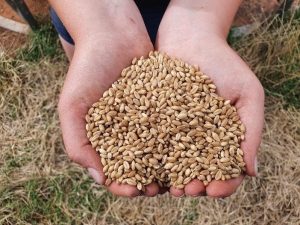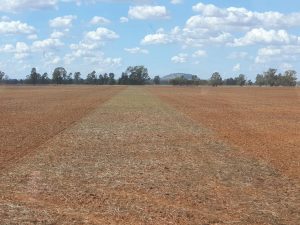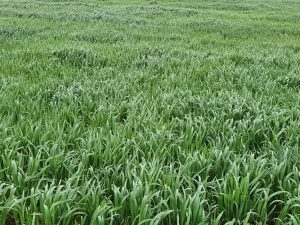Ray Penfold and his family Jessie (7), Matilda (11), Quade (10), Amanda (11).
Location: Quandialla and Condobolin, Central West NSW
Produce: Certified organic oats and barley, conventional cropping and livestock (Merino sheep, Hereford-Angus cross cattle)
Ruth and Ray Penfold and their families have been farming for generations. Their current business structure has been in operation since 2011.
Following severe drought, they moved to certified organic cereal cropping in 2021 and have just delivered their first harvests this year. However, even within their conventional operations, Ruth and Ray already farm in a fairly regenerative manner, avoiding sprays wherever possible, using certified organic and natural fertilisers. They also focus heavily on soil health to boost crop production and improve the quality and diversity of feed available for their merino sheep and Hereford-Angus cross cattle.
“Fundamentally we want to farm in a better way so that our kids have got a viable business moving forward, and if you can look after your soil, it grows the grass for your livestock, it grows your crop for your grain, so you have to look after it,” Ruth said.
As newcomers to organic farming, they have joined ORICoop, a National Organic Producers Cooperative, that enables producers to build more resilient markets while enabling investment into supply chain barriers. Ruth and Ray have taken part in the ORCA project, which has received funding from Sustainable Table Fund, to understand the barriers for new and experienced organic grain producers across the Riverina, and to identify strategic pathways to a more transparent and profitable outcome for producers.
“I like the fact we can send grain down direct to the farmer, and you’re also dealing with another farmer on the buyer’s side who are also trying to have a sustainable business for their kids moving forward as well,” Ruth said.
“I really like what ORICoop and ORCA is looking to achieve, and we’ve already sent a few loads through the new process. From an organics producers’ mind, the feed market is such a big industry, and where do you start if you don’t have the contacts as a beginner? Through conversations and a workshop, I got in touch with Carolyn from ORICoop, and understood what ORICoop is trying to achieve through the ORCA project. This is a game changer especially for someone new coming into the market.”
Ruth and Ray live in a marginal area, so they need to be mindful of what they grow and when. And make the most of each market.
“We’ve been fully certified since 2021, last year’s crop for us was our first certified crop. We had a good growing season, above average rainfall. We are in a marginal area in central NSW you get more dry years than wet years, and last year was just unbelievable as far as the rain that fell, the rain continued when we were ready to harvest, there were a lot of downgrades,” Ruth said.
“We are open to trialing different crops should there be a market for specific crops that also align with seasonal conditions.’ Cereals, particularly wheat, oats and barley, are well-suited to our rotation. Our oats and barley are very easy to grow, and if you’ve got a failed crop you’ve got options, particularly when you are a mixed enterprise, you’ve got livestock to graze off or hay for either stockfeed or sale. Sunflowers would be on our radar if seasons permit, however with sunflowers they aren’t multi purpose they only have one purpose – sale. That’s why we’re just with the cereals at the moment, and we’re also new to the organic industry, we need to find our feet, establish a network and diversify our risk.
ORCA is also undertaking grain storage and processing potential for organic farmers in the Riverina region, which Ruth sees as being important to addressing some of the other key challenges organic grain and cereal producers face.
“The biggest downfall with being certified for us is grain storage, you have to have good grain storage, and it has been an achilles for us, so we have invested in on-farm storage this year. If ORCA are able to provide grain storage it would certainly help – we would still invest in further on-farm storage in due course, but instead of having the capital outlay of $200,000 to $300,000 in the short term, it gives producers the ability to keep growing and expanding or being able to capitalise on good seasonal conditions.” Ruth said.
“Definitely for us, the storage facility would encourage us to increase our certified country, knowing that we can then transport our certified grain to the storage site in southern NSW, it’s closer to the end market. The additional storage site would be of benefit to our business in the immediate future. If we were to diversify into other crops, like sunflowers, then the processing side would also be a big benefit to us. We also know other producers in the Riverina, where the processing side would be of benefit to them as opposed to the storage, so the combination of the two is fantastic.”
A key part of ORCA is transparency, ensuring consumers and buyers are getting high quality, ethically-grown products, as well as ensuring farmers receive fair pricing for their produce.
“The whole paddock to plate is incredibly important for the transparency of the industry, and it is just the way everything will go,” Ruth said.
“Our two big things are transparency, and understanding the story of the buyer, the feel-good warm fuzzy moment of knowing you’re selling to a mum-and-dad dairy farm that are trying to do the same as you, provide a cleaner product and future for your kids. Being able to understand the processor’s requirements and then being able to grow that grain, knowing you have a market for your product just makes good business sense.”
To enquire about bulk organic grain requirements you can contact ORCA directly or via email admin@organicinvestmentcooperative.com.au
Story written by Amanda Sproule
The ORCA project is grateful for the seed funding from The Sustainable Table Fund.




